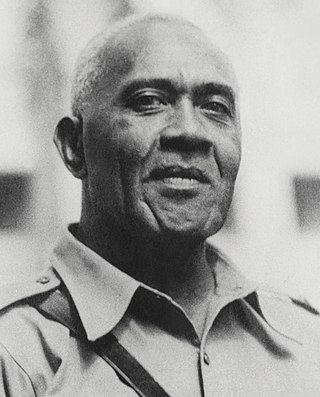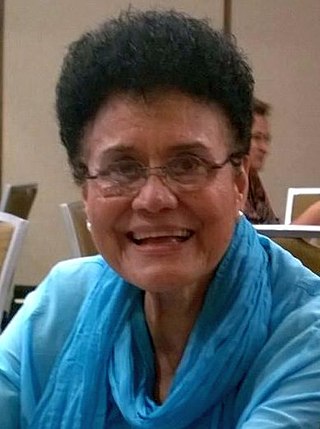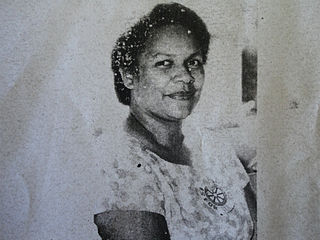Related Research Articles

Articles about people, places, things, and concepts related to or originating from Fiji, include:

The Great Council of Chiefs is a Fijian constitutional body. It previously existed from 1876 to March 2012 and was re-established in May 2023.

RatuSir Josefa Lalabalavu Vanayaliyali Sukuna was a Fijian chief, scholar, soldier, and statesman. He is regarded as the forerunner of the post-independence leadership of Fiji. He did more than anybody to lay the groundwork for self-government by fostering the development of modern institutions in Fiji, and although he died a dozen years before independence from the United Kingdom was achieved in 1970, his vision set the course that Fiji was to follow in the years to come.

RoLala, Lady Mara, maiden name Litia Cakobau Lalabalavu Katoafutoga Tuisawau was a Fijian chief, who was better known as the widow of Ratu Sir Kamisese Mara, modern Fiji's founding father who served for many years as Prime Minister and President of his country. As Fiji's First Lady, Adi Lala took on a diplomatic role, frequently representing her country abroad. She was regarded as a formidable and astute woman, whose influence on her husband was said to be considerable.
Ratu is an Austronesian title used by male Fijians of chiefly rank. An equivalent title, adi, is used by females of chiefly rank. In the Malay language, the title ratu is also the traditional honorific title to refer to the ruling king or queen in Javanese culture. Thus in Java, a royal palace is called "keraton", constructed from the circumfix ke- -an and Ratu, to describe the residence of the ratu.

The Soqosoqo ni Vakavulewa ni Taukei (SVT), occasionally known in English as Fijian Political Party, was a party which dominated the politics of Fiji in the 1990s and was the mainstay of coalition governments from 1992 to 1999.
Dr. Ahmed Ali was a Fijian academic and politician who held Cabinet office several times from the late 1970s onwards. Unlike the majority of his fellow Indo-Fijians, he was aligned with the Alliance Party of Prime Minister Ratu Sir Kamisese Mara in the 1970s and 1980s, and with the Soqosoqo Duavata ni Lewenivanua Party of Laisenia Qarase in the early 2000s. He was one of only two Indo-Fijians to agree to serve in the interim government established in the wake of two military coups carried out to assert indigenous political supremacy in 1987.
Qoriniasi Babitu Bale was a barrister, a solicitor and a politician who served twice as Fiji's Minister for Justice and Attorney-General, most recently from 2001 to 2006, when he was deposed in the military coup of 5 December. Like many of Fiji's most influential leaders, Bale was a native of Levukana Village in Vanua Balavu in the Lau Islands.

The "Blue Ribbon campaign" was the name for the campaign promoting support for the controversial legislation introduced by the Fijian Government in 2005 to establish a Reconciliation and Unity Commission. The name specifically comes from the blue ribbons promoted by the ruling United Fiji Party as a sign of support for the bill. This campaign had the strong support of Prime Minister Laisenia Qarase, Attorney General Qoriniasi Bale, and other members of the ruling coalition and was warmly welcomed by imprisoned coup instigator George Speight. The proposed Commission was intended to have the power to grant compensation to victims, and amnesty to perpetrators, of the coup d'état which deposed the elected government in May 2000.
Adi Lagamu Lewaturaga Vuiyasawa is a Fijian businesswoman and former politician who served in the Senate of Fiji from November 2005 to December 2006. She was the partner and later wife of Senator Ratu Inoke Takiveikata, and the sister of Jone Baledrokadroka.
Naitasiri is one of the 14 provinces of Fiji and one of eight located on Viti Levu, Fiji's largest island.
Nakorotubu is one of nineteen districts in Fiji's Ra Province. It consists of seven sub-districts or sub-regions: the five villages of Namarai, Nacobau, Nadavacia, Saioko and Verevere.

Adi Mere Tuisalalo Samisoni was a Fijian businesswoman and politician, from Lomaloma village on the island of Vanua Balavu in Fiji's Lau archipelago. Samisoni was formerly a member of Parliament for the opposition party SODELPA. She served as mayor of Lami and as a member of the now-defunct House of Representatives.
Lelean Memorial School is the largest school in Fiji. It was established in 1943 and is run by the Methodist Church of Fiji and Rotuma. It is co-located at the Davuilevu Methodist Compound with the Davuilevu Theological College and the Young People's Department, which runs training for Methodist catechists.

Adi Losalini Raravuya Dovi was a Fijian politician and lady of rank in Fiji's chiefly leadership. In 1966 she was jointly one of the first women elected to parliament, serving in the House of Representatives until 1977. She also served as Assistant Minister for Urban Development and Social Welfare from 1975 to 1977.
Ratu Jione Atonio Rabici "Tom" Doviverata was a Bau chief and medical doctor and administrator in colonial Fiji.
Malani may refer to:
Ratu Tiale Wimbledon Thomas Vuiyasawa was a Fijian chief, civil servant and politician. He served as a member of the Legislative Council and Senate.
References
- 1 2 3 4 5 Tauga Nacanaitaba (September 12, 2017). "'A Legacy to Remember'". Fiji Times. p. 11. Archived from the original on 2017-09-30.